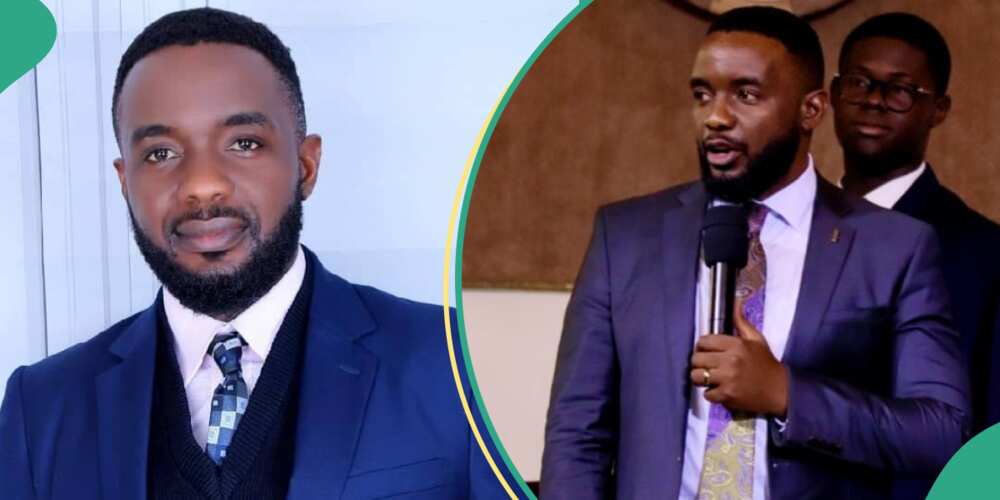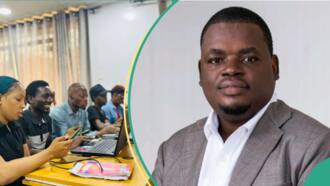Award-Winning Educationist Reveals Ways to Improve Education Standard in Nigeria
- Maltina Teacher of the Year 2019, Collins Ezem, has called on the Minister of Education, Professor Tahir Mamman, to prioritise curriculum reform and training of teachers
- Ezem said education has the ability to contribute to Nigeria's growth and prosperity in years to come
- During an exclusive interview with Legit.ng, the award-winning educationist outlines steps to achieving optimal performance in WAEC, JAMB, NECO
PAY ATTENTION: Unlock the best of Legit.ng on Pinterest! Subscribe now and get your daily inspiration!
FCT, Abuja - Founder of Cozek Education Consult and Maltina Teacher of the Year 2019, Collins Ezem, has proffered solutions to some critical issues in the educational sector in Nigeria.
Ezem said Nigeria is a nation that has always placed a high value on education as a crucial element of national development and believed the appointment of Professor Tahir Mamman as the new Minister of Education will birth the right policies and actions.

Source: Facebook
In an exclusive interview with Legit.ng, he made known his expectations from Professor Mamman and the immense potential of education.
He said education is the "transformative change that can empower the youth, strengthen the workforce, and ultimately contribute to Nigeria's growth and prosperity in the years to come."
PAY ATTENTION: Сheck out news that is picked exactly for YOU ➡️ find the “Recommended for you” block on the home page and enjoy!
“Firstly, I hope to see increased access to quality education for all children, regardless of their location or socio-economic background. I believe that all children deserve the opportunity to receive a high standard of education, and initiatives should be put in place to cater to the needs of out-of-school children.
“Secondly, I look forward to seeing curriculum reforms that reflect the changing needs of the job market. The curriculum should foster critical thinking, problem-solving, and practical skills that will allow graduates to thrive in a global economy.

Read also
The Nest Co-founder, Peter Ogedengbe, speaks on empowering Nigerian youth for startup excellence
“Thirdly, teacher training programs and the welfare of educators must be improved. Well-trained and motivated teachers are essential to delivering quality education. Continuous professional development will help teachers discharge their jobs effectively, and their welfare should be prioritized.
“Fourthly, Nigeria's tech-savvy youth population should be harnessed to promote technology integration into the education system. I hope to see investments in digital resources, e-learning platforms, and innovative teaching methods that harness the power of technology.
“Fifthly, educational disparities among different regions and social groups must be addressed. The new Minister of Education is expected to implement policies addressing these disparities, ensuring no one is left behind.
“Sixthly, corruption and mismanagement must be tackled to ensure transparency in education funding and hold those who misappropriate resources accountable.
“Seventhly, I anticipate a renewed focus on technical and vocational education. Promoting skills development can contribute to job creation and reduce unemployment rates among youth.

Read also
“Apply now”: Google offers N75m grant for 15 lucky Nigerian business owners, seeks applicants
“Lastly, I expect the new minister to foster collaboration between the Ministry of Education, schools, parents, and communities. Partnerships with non-governmental organizations, private sectors, and international bodies can also enhance the quality of education.
The award-winning educationist also spoke about how students can make good grades in public examinations like WAEC, NECO, and UTME examinations.
Ezem said it can be tasking but achieving optimal performance is possible with the right mindset and preparation.
He suggested the following nine points:
1. Starting preparations early is key to success.
2. Teachers must be adequately trained to effectively teach examination classes.
3. Reviewing past questions and answers cannot be overemphasized.
4. Students need to dedicate ample time to studying for the examination. Casual reading is not enough.
5. Students should be given several mock tests before the actual examination to help them feel more confident.
6. Setting measurable goals can help students stay motivated throughout the preparation process.

Read also
Rising stars: Nigerian youths driving change in society, Olusegun Obasanjo visited one of them
7. Examination malpractice should be discouraged by all stakeholders in education. Students should be guided on the right subjects to choose and sit for their examination based on the courses they choose to study.
8. Parents should encourage their children to stay away from friends and activities that might distract them from excelling in examinations.
9. Schools should take all necessary steps to create a conducive environment for students to study, such as providing a library.
Role of Parents in their Children’s academic performance
The Abuja-based teacher said parents play crucial roles in improving their children's academic performance as every child is unique.
Ezem said parents should tailor their involvement to their children's individual needs and learning styles.
He noted that a balanced approach that combines support, guidance, and independence is often the most effective in improving academic performance.
Here are some critical parts in both academics and preparing for examinations:
1. Support and Encouragement: Parents should provide emotional support and encouragement to boost their child's confidence and motivation.
2. Establishing a Learning Environment: Creating a conducive study environment at home with minimal distractions helps children focus on their studies.
3. Communication: Regular communication with teachers to monitor a child's progress and address academic concerns is essential.
4. Setting Realistic Expectations: Encouraging children to set achievable academic goals and not overburdening them with unrealistic expectations.
5. Homework Assistance: Assisting with homework and providing guidance when needed without doing the work for them.
6. Organizational Skills: Teaching organizational skills, time management, and effective study habits.
7. Resource Provision: Ensuring access to necessary learning resources, such as books, websites, and materials.
8. Cultivating a Love for Learning: Fostering a love for learning by exposing children to various subjects and encouraging curiosity.
9. Balancing Extracurricular Activities: Helping children balance academics and extracurricular activities.
10. Healthy Lifestyle: Promoting a healthy lifestyle with adequate sleep, nutrition, and exercise, as these directly impact academic performance.
When preparing for examinations specifically:
11. Exam Preparation: Guiding in creating study schedules and strategies for exam preparation.
12. Practice Tests: Encouraging practice tests and quizzes to reinforce learning and build confidence.
13. Stress Management: Helping children manage exam-related stress and anxiety through relaxation techniques and emotional support.
14. Review and Feedback: Review their progress periodically and provide constructive feedback.
15. Celebrating Achievements: Celebrating big and small academic achievements to motivate and boost self-esteem.
"It's not a welcome Idea": WAEC announces plan to introduce CBT for WASSCE
Meanwhile, Legit.ng reported that after years of paper-based tests, the West African Examinations Council said plans to introduce the Computer-Based Test (CBT) mode for its examinations have reached an advanced stage.
This was disclosed by WAEC's head of national office in Nigeria, Patrick Areghan, in an interview with the News Agency of Nigeria on Saturday, September 23, in Lagos.
Source: Legit.ng



